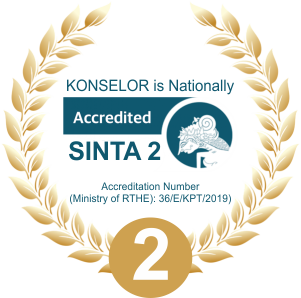Hubungan Perencanaan Karier dan Efikasi Diri dengan Kesipan Kerja Mahasiswa
 ), A Muri Yusuf(2), Z Mawardi Efendi(3),
), A Muri Yusuf(2), Z Mawardi Efendi(3), (1) Universitas Negeri Padang
(2) Universitas Negeri Padang
(3) Universitas Negeri Padang
 Corresponding Author
Corresponding Author
Copyright (c) 2017 Konselor
DOI : https://doi.org/10.24036/02017616535-0-00
Full Text:
 Language : en
Language : en
Abstract
This research was conducted by a high amount of unemployment from graduate students of university. The high amount of unemployment from graduate students of university indicated that undergraduate students had low work readiness. Career planning and self-efficacy were the factors assumed that influenced work readiness. This research was intended to describe: (1) career planning, self-efficacy, and work readiness of undergraduate students, (2) the correlation of career planning with work readiness, (3) the correlation carrier planning and self-efficacy with work readiness. This research applied correlational descriptive research with quantitative method. The population of this research was the seventh and ninth undergraduate students semester of Guidance and Counseling of UIN Suska Riau consisting of 139 undergraduate students, the sample consisted of 103 undergraduate students chosen by using proportional stratified random sampling technique. The instrument used was likert scale model. The data were analysed by using descriptive statistic, simple regression and multiple regression. The research findings indicated that: (1) career planning of undergraduate students was averagely included into good category, self-efficacy of undergraduate students was averagely included into high category, work readiness of undergraduate students was averagely included into high category, (2) there was a significant correlation between career planning with work readiness about 28,7% (R = 0,536, significance 0.000), (3) there was a significant correlation between self-efficacy with work readiness about 16.4% (R = 0.405, significance 0.000), (4) there was a significant correlation between carrier planning and self-efficacy with work readiness about 33.2% (R = 0.576, significance 0.000)
Keywords
References
Anoraga, P. (2004). Psikologi Kerja. Jakarta: Rineka Cipta.
Anoraga, Panji. (2009). Manajemen Bisnis. Semarang: PT. Rineka Cipta.
Ardi, Z. (2014). Cita-cita Perkerjaan dan Pilihan Peminatan Siswa Sekolah Menengah Atas Negeri di Sumatera Barat.
Ardi, Z., & Hariko, R. (2014). Gambaran Kegiatan Belajar Siswa Sumatera Barat.
Ardi, Z., & Yendi, F. M. (2013). Konseling Online: Sebuah Pendekatan Teknologi Dalam Pelayanan Konseling. Jurnal Konseling dan Pendidikan, 1(1), 1-5.
Bandura, A. (1997). Self-Efficacy: Toward a unifying theory of behavior change. Psychological Review.
Brady, R. P. (2010). “Work Readiness Inventory Administrastartor’s Guide”. (Online) (http://www. jist. Com/ shop/ web/ workreadiness inventory administrator guide.pdf, diakses 10 Maret 2015).
Caballero, C. L., Walker, A., & Tyszkiewich, M. F. (2011). “The Work Readiness Scale: Developing a measure to asses work readiness in college graduates. Journal of Teaching and Learning Graduate Employability. 2(2):41-54.
Dacre Pool, L., & Sewell, P. (2007). The key to employability: developing a practical model of graduate employability. Education+ Training, 49(4), 277-289.
Daharnis, D., & Ardi, Z. (2016). The Compatibility Student Choice of University Majoring; A Preliminary Studies. GUIDENA: Jurnal Ilmu Pendidikan, Psikologi, Bimbingan dan Konseling, 6(1), 101-109.
Dirwanto. (2008). “Analisis Faktor-faktro yang Mempengaruhi Kesiapan Kerja Pada Siswa SMK Ma’arif NU Kesesi Pekalongan Tahun Pelajaran 2007/2008”. Tesis tidak diterbitkan. Surakarta: Program Pascasarjana Universitas Sebelas Maret.
Gumiwang, R. (2014). “BPS: Sarjana Menganggur Kian Banyak”. (Online), (http. Kabar24.com BPS Sarjana Menganggur Kian Banyak Kabar24 - Bisnis.com.html, diakses 25 Februari 2015).
Gundana, R. (2013). “Muhaimain Iskandar: 600.000 Sarjana di Indonesia Jadi Pengangguran”. (Online), (http://www. tribunnews.com/ nasional 2013/11/03 muhaimin- iskandar-600- ribu- sarjana- di- indonesia-jadi pengangguran, diakses 25 Februari 2015)
Hurlock, E. (1980). Psikologi Perkembangan: Suatu pendekatan sepanjang rentang kehidupan. Terjemahan oleh Istiwidiyanti. Jakarta: Erlangga.
Issacson, L. E. (1986). Career Information in Counseling and Career Development. Boston: Allyn & Bacon, Inc.
Jungert, T & Rosander, M. (2010). “Self-Efficacy and Strategies to Influence the Study Environment”. Journal Teaching in Higher Education. 15:647-659.
Mashigo, A. C. L. (2014). “Factor Influencing Work Readiness of Graduate: An exploratory study”. Tesis tidak diterbitkan. Cape Town: Stellenbosch University.
Prayitno. (2007). Pengembangan Potensi Mahasiswa. Padang: UNP Press.
Rico. (2014). “Lulusan UIN Harus Mampu Bersaing di Dunia Kerja”. (Online), (http://www. gagasan-online.com/2014/03/ lulusan- uin- harus- mampu-bersaing-di.html, diakses 20 Februari 2015).
Syafiq, A., & Fikawati, S. (2007, February). Kompetensi yang Dibutuhkan Dalam Dunia Kerja (Berdasarkan Tracer Studies FKMUI). Disampaikan pada Seminar Terbuka Ruang Sidang Doktor Gedung G FKMUI.
Utami, Y. G. D., & Hudaniah. (2013). “Self-Efficacy dengan Kesiapan Kerja Siswa Sekolah Menengah Kejuruan”. Jurnal Psikologi Terapan Universitas Negeri Malang. 01 (01):39-51.
Widjaja, H.A.W. (1987). Ilmu Komunikasi Pengantar Studi. Jakarta: Rineka Cipta.
Winkel, W. S. (2004). Psikologi Pendidikan dan Evaluasi Belajar Jakarta: PT. Gramedia Pustaka Utama.
Winkel, W. S., & Hartati, S.(2007). Bimbingan dan Konseling di Institusi Pendidikan. Jakarta: Gramedia.
Yusuf, A. M. (2002). Kiat Sukses dalam Karier. Bogor: Ghalia Indonesia.
 Article Metrics
Article Metrics
 Abstract Views : 5693 times
Abstract Views : 5693 times
 PDF (Bahasa Indonesia) Downloaded : 2966 times
PDF (Bahasa Indonesia) Downloaded : 2966 times
Refbacks
- There are currently no refbacks.
Copyright (c) 2017 Konselor

This work is licensed under a Creative Commons Attribution 4.0 International License.







